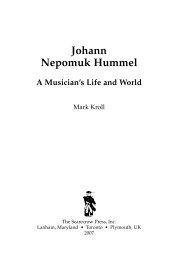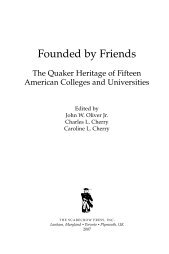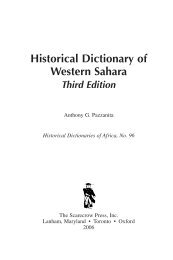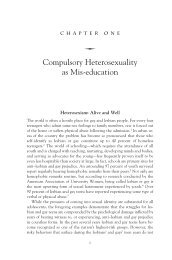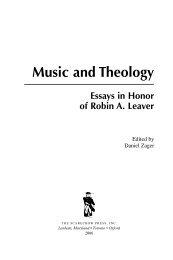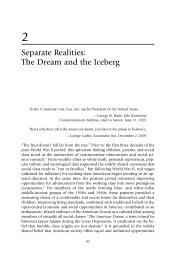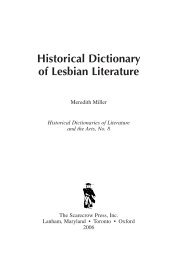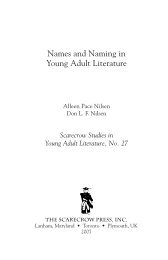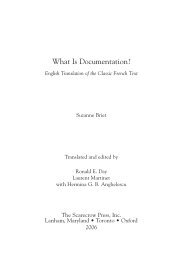Postwar German Cinema and the Horror Film - Scarecrow Press
Postwar German Cinema and the Horror Film - Scarecrow Press
Postwar German Cinema and the Horror Film - Scarecrow Press
Create successful ePaper yourself
Turn your PDF publications into a flip-book with our unique Google optimized e-Paper software.
xx Steffen Hantke<br />
More importantly perhaps, it also raises <strong>the</strong> question why, of all places, <strong>the</strong><br />
splatter film should have flourished as much as it did in <strong>German</strong>y from <strong>the</strong><br />
1980s on, linking it particularly to anxieties about <strong>German</strong> reunification <strong>and</strong> its<br />
aftermath. With <strong>the</strong>se basic questions addressed, <strong>the</strong> second essay in this section,<br />
Mikel J. Koven’s “Buttgereit’s Poetics: Schramm as <strong>Cinema</strong> of Poetry” performs<br />
a reading of what one might call splatter aes<strong>the</strong>tics. Using Jörg Buttgereit’s<br />
serial killer film Schramm, Koven demonstrates <strong>the</strong> basic visual <strong>and</strong><br />
narrative mechanisms of splatter films <strong>and</strong> points out stylistic influences that<br />
link Buttgereit to more respected oppositional filmmakers, most notably Pier<br />
Paolo Pasolini. Focusing on <strong>the</strong> two films that established Buttgereit as <strong>the</strong> enfant<br />
terrible of postwar <strong>German</strong> cinema, Patricia MacCormack picks up <strong>the</strong> issue<br />
of cinematic style where Koven’s analysis left off. Style, in MacCormack’s<br />
analysis, is more a matter of collective than individual expression, an index of<br />
cultural obsessions <strong>and</strong> taboos. With <strong>the</strong> non-judgmental eye of <strong>the</strong> anthropologist,<br />
MacCormack’s “Necrosexuality, Perversion <strong>and</strong> Jouissance: The Experimental<br />
Desires of Jörg Buttgereit’s NekRomantik <strong>Film</strong>s” provides a perspective<br />
on what, to many viewers <strong>and</strong> critics, is perhaps <strong>the</strong> most controversial aspect of<br />
Buttgereit’s work—his preoccupation with <strong>the</strong> body after death.<br />
The fifth <strong>and</strong> final section of <strong>the</strong> book, entitled “Interviews: Three <strong>German</strong><br />
<strong>Horror</strong> <strong>Film</strong> Directors” gives three contemporary <strong>German</strong> filmmakers an opportunity<br />
to speak for <strong>the</strong>mselves—Jörg Buttgereit, Robert Sigl, <strong>and</strong> Nico Hoffmann.<br />
While American readers may be somewhat familiar with Buttgereit, Sigl<br />
<strong>and</strong> Hoffmann are still relatively unknown outside of <strong>German</strong>y, yet deserve<br />
wider recognition. It is <strong>the</strong>ir maneuvering between auteurist <strong>and</strong> commercial<br />
cinema, between directing <strong>and</strong> producing, as well as between film <strong>and</strong> television—more<br />
so perhaps than Buttgereit’s more straightforward career path—that<br />
illustrates some of <strong>the</strong> problems for contemporary <strong>German</strong> filmmakers who operate<br />
in or around <strong>the</strong> boundaries of popular genres. In conversation with Marcus<br />
Stiglegger, all three, in discussing <strong>the</strong>ir careers <strong>and</strong> <strong>the</strong> social <strong>and</strong> economic<br />
circumstances under which <strong>the</strong>ir films were made, provide valuable insights into<br />
<strong>the</strong> current <strong>German</strong> film industry. All three interviews are made available in<br />
English for <strong>the</strong> first time.<br />
For <strong>the</strong>ir hard work, patience, <strong>and</strong> perseverance, I would like to express<br />
my gratitude, first <strong>and</strong> foremost, to <strong>the</strong> contributors to this project. I am also<br />
greatly indebted to Jay McRoy <strong>and</strong> Donald Bellomy for editorial favors beyond<br />
<strong>the</strong> call of duty. My thanks also goes to all those friends <strong>and</strong> colleagues who<br />
have contributed ideas, criticism, <strong>and</strong> encouragement in casual <strong>and</strong> not so casual<br />
conversations over a long period of time, most notably among <strong>the</strong>m David Willingham<br />
<strong>and</strong> Elisabeth Frazier, as well as Jack O’Connell. And, as always, I<br />
wish to thank my family, especially my mo<strong>the</strong>r, without whom nothing ever<br />
would have happened.



